

Adult Education: some reflections. Country reports 2015. European Inventory on Validation of non formal and informal learning 2014, Country Report Portugal. Portugal-Diagnostic-Report-web. Information by country:- Portugal. Developing relevant skills PISA mean performances between 2006 and 2012 Source: OECD (2013b), Education at A Glance, 1.
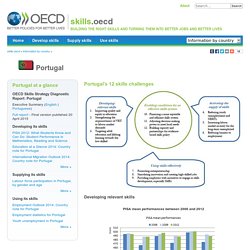
Improving equity and quality in education: Portugal has taken significant steps to improve both access to basic education and the quality of the education system. Most recently, compulsory education has been extended to cover 12 years from age 6 to age 18. However, Portugal’s results in PISA 2012 are around the OECD average in mathematics and below the OECD average in reading and science, and it is one of the OECD countries where students’ socio-economic background has an above average impact on their results. 2. Further improvements, including a stronger component of work-based learning, would help to ensure that the VET system is coherent, well communicated and aligned to the needs of the labour market. 3. Activating skills supply Youth unemployment rates at ages 15-24, in percentages Source: OECD (2014c), OECD Statistics, Unemployment Rates by Age and Gender, 4. 5. 6. Portugal - Strong Performers and Successful Reformers in Education.
Educationtoday: Skills will drive inclusive economic growth in Portugal. Skills and human capital are the bedrock upon which Portugal is building a new bridge to growth.
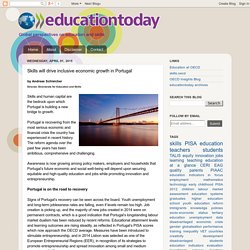
Portugal is recovering from the most serious economic and financial crisis the country has experienced in recent history. The reform agenda over the past few years has been ambitious, comprehensive and challenging. Awareness is now growing among policy makers, employers and households that Portugal’s future economic and social well-being will depend upon securing equitable and high-quality education and jobs while promoting innovation and entrepreneurship. Portugal is on the road to recovery Signs of Portugal’s recovery can be seen across the board. Building a shared diagnosis of Portugal’s skills challenges We know that in countries where a significant proportion of adults have poor skills, it is difficult to introduce productivity-enhancing technologies and new ways of working. Yet skills affect more than just earnings and employment. Portugal’s 12 skills challenges. Cr portugal. Licínio Lima: "Adult education should become more dangerous" - European Association for the Education of Adults.
Adult education needs to go back to its roots and focus on the issue of social inclusion instead of just skills for economic competitiveness.
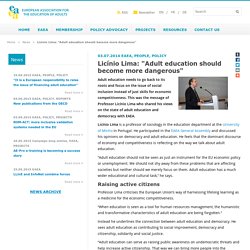
Accreditation of prior learning as a lever for lifelong learning. Lessons learnt from the New opportunities initiative, Portugal. OECD (2015), Adult education level (OECD - Average and Portugal) Education attainment - Adult education level - OECD Data. Interactive charts by the OECD. National Agency for Qualification and Vocational Education and Training. Adult education in Europe 2014 - A Civil Society View - European Association for the Education of Adults. On a daily basis, EAEA monitors proceedings on the general European level, and advocates for the importance of adult education.
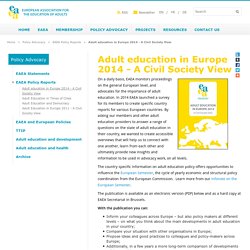
In 2014 EAEA launched a survey for its members to create specific country reports for various European countries. By asking our members and other adult education providers to answer a range of questions on the state of adult education in their country, we wanted to create accessible overviews that will help us to connect with one another, learn from each other and ultimately provide new insights and information to be used in advocacy work, on all levels. The country specific information on adult education policy offers opportunities to influence the European Semester, the cycle of yearly economic and structural policy coordination from the European Commission. Learn more from our infonote on the European Semester. The publication is available as an electronic version (PDF) below and as a hard copy at EAEA Secretariat in Brussels. Is Portugal dismantling grassroots adult education? - LLinE.
The order arrived between Christmas and New Year’s Day.
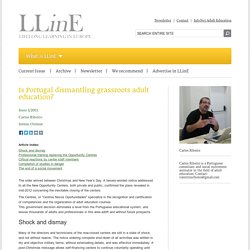
A tersely-worded notice addressed to all the New Opportunity Centers, both private and public, confirmed the plans revealed in mid-2012 concerning the inevitable closing of the centers. The Adult Education System in Portugal. Apart from the number of persons enrolled in educational or vocational training on an ordinary basis, approximately 900,000 Portuguese adults - according to official figures - are currently enrolled in adult continuing education courses aimed at vocational qualifications, approximately 300,000 of whom have already earned a general certification.
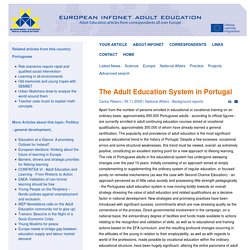
The popularity and prevalence of adult education is the most significant popular educational trend in the history of Portugal. Despite a few excesses, occasional errors and some structural weaknesses, this trend must be viewed, overall, as extremely positive, constituting an excellent starting point for a new approach to lifelong learning. The role of Portuguese adults in the educational system has undergone sweeping changes over the past 10 years. 1. 2.
The ANQ is developing a follow-up to this range of educational possibilities in association with the regulations governing the systems of qualification. 3. 4. 5. Details: